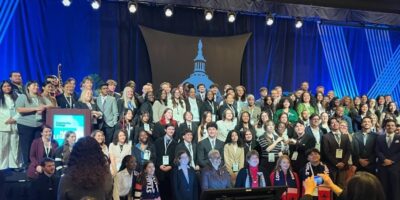Over coffee and Greek scrambled eggs at the Albert Park Deli Café in Melbourne, Australia yesterday, one of the world’s most positive men asked me an important question: “What makes you optimistic?”
It’s a question Victor Perton, former Victorian parliamentarian, Commissioner to the Americas, founder of the Australian Leadership Project, and author of The Case for Optimism: The Optimists’ Voices has been asking people all around the world, in his quest to “give voice to the yearning for a positive approach to leadership and life.”
Our paths first crossed on Twitter last spring, when I received the annual Pacesetter Award from the National Council on Marketing and Public Relations for community college advocacy and Victor ran across a tweet that described me as an “optimistic thought leader.”
We swapped a few messages and shared some resources via social media, but other business had taken me to the land Down Under this week, so we had our first opportunity to actually meet, and for Victor to ask the question that will be the title of his next book: What Makes You Optimistic?
I explained that, despite the very real challenges we still face in this world, when you take the long view, nearly everything is getting better. There is less violence, war, disease, and famine; and more food, clean water, and safe shelter than at any point in human history. While we may not like some of the side effects of modern living, technological changes that would have seemed like magic generations ago have brought the world closer together in transportation, communications, and commerce; while science has more than doubled the years of our lives.
On top of all that, I am an educator. Positive change, in people and societies, is at the very core of our being.
And besides, I told Victor, I don’t know any other way to be. I was born optimistic. How about you?
With pride in his voice, he explained that he was the son of refugees from Latvia and Lithuania. Members of his family had perished at the hands of first the Soviets, then the Germans, in concentration camps, forced labor, and horrific battles like the firebombing of Dresden during the Second World War.
Like many refugees from the Baltics fleeing devastation and genocide, Victor’s father and mother settled in Australia, and rebuilt their lives. His grandmother stayed behind, survived the Gulag, and witnessed the fall of the Soviet Union in 1991; while his mother, Lilia, is ninety years old and attributes her good health to daily meditation, yoga (which she teaches twice a week), and a positive mindset.
Optimism is in his genes.
Me, too, I shared with Victor—although I didn’t know it until a few years ago.
I was adopted, and my genes were a mystery until I was in my thirties and met my biological parents and siblings. Suddenly, my family tree grew a lot bigger, filled with colorful characters and fascinating lessons about nature and nurture.
One of those characters, my great grandfather, Wiley Rogers, was a hard-working, no-nonsense businessman, with a strong commitment to helping others and an indomitable will. Back in 1942, after his Camden, Arkansas wood mill burned to the ground, he found a new line of work: With a sledgehammer, a few hydraulic jacks, a winch or two, and a flatbed trailer, he moved houses for a living.
His motto for this monumental task?
It is summed up in four words on a small desktop sign that Wiley’s granddaughter, my mother, gave me: “It CAN Be Done.”
As you head out the door tomorrow on your way to school or work, take a look back over your shoulder at your house. Then, imagine it rolling slowly down the street to some lovely new spot—perhaps near the beach with a view of the ocean.
Nervous?
Not Wiley. With experience, skill, and roll-up-your-sleeves-and-get-it-done confidence, he insisted no job was too large or too complicated.
Attitude matters.
Every day, we face great challenges—in our personal lives, in our professional lives, in our families, and in our communities. Whatever the problem, though, it pays to remember:
Believe it, and you will see it.
People who try are more successful than people who don’t try.
You miss 100% of the shots you don’t take.
It CAN Be Done.
Thank you, Victor Perton, for asking positively provocative questions and spreading optimism around the world; and thank you Wiley, Lilia, and everyone else who has persevered and given the generations to follow plenty of reasons to be optimistic.
May my children, and yours, one day say the same for us.








